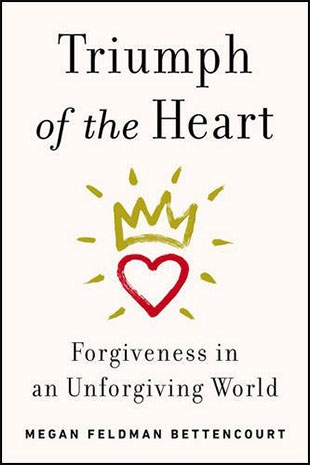Levels of Forgiveness
"As I began writing about what I'd learned in my year of travel and research, friends and colleagues reacted in various ways when they found out I was writing about forgiveness. Many asked me if forgiveness meant forgoing legal action, excusing damaging behavior, or letting yourself be mistreated. No wonder so many people, including me, associated forgiveness with weakness. I would explain that no, giving up resentment does not rule out justice or self-protection. And as for being weak, I'd come to understand what Gandhi said about forgiveness. He described it as 'the ornament of the brave.' It takes courage and great strength to forgive. It might even be the hardest thing you ever do, but it will bring a new sense of liberation that nothing else could ever touch.
"Another common misconception about forgiveness concerns how long it takes. 'Is it a one-time thing?' people would ask me. 'Do you do it and then it's done?' There's no one answer to this, of course, since the process varies from person to person. But most of those I profiled indicated that far from being a single, earth-shattering accomplishment with an end point, forgiveness is more like a regular habit or practice, like being optimistic or mindful or patient. Sure, when it comes to forgiving someone for spilling their coffee on you at Starbucks, it might be over in a moment. But for the bone-rattling, soul-injuring wounds for which forgiveness is most important, it is a process that ebbs and flows, one that may feel complete one day and begin yet again the next.
"One especially thorny issue for me – and for many others, I discovered – was this: Does forgiveness require reconciliation? And does it imply that you must feel warm and fuzzy and loving toward your former enemy? Researchers and therapists are divided on this, with some saying that neutrality is sufficient, while others argue that forgiving must literally mean loving your enemies. I concluded that from a certain perspective, both views are true. Neutrality, after all, allows someone to live peacefully, and it allows the forgiver to live peacefully, too. I would even argue that neutrality is its own category of love. When you're neutral, you're doing no harm and you're letting someone be. And letting someone be, free of your judgments or blame or rage, implies a certain level of respect, an acceptance that that person, whoever she may be and whatever she may have done, is worthy of being here, on this brutal and beautiful planet, just like you are. Isn't that love?
"Accepting someone's intrinsic human worthiness, even when you may not like the person or want to spend holidays with him, certainly dovetails with the concept of agape, the type of love that in ancient Greek referred to a love extended to all people, whether strangers or family members. The Greek word was translated into Latin as caritas, the origin of the English word 'charity.'In Buddhism, the idea of metta, or 'universal loving-kindness,' is similar to agape.
For practical purposes, I suggest thinking about forgiveness as containing levels. When I was in Rwanda, listening to Jean-Baptiste talk about extending love to the man who killed his mother, I was awed. But I also wondered: Is it necessary for everyone to take this process so far? To not only forgive but also reconcile and even befriend an offender? Sam, the family friend and psychologist I'd talked to at the start of this project, had told me that he didn't think people should force forgiveness or even attempt it if they're not ready, much less reach out to whomever hurt them to reconcile. But he also said something that kept echoing in my mind as Truth the deeper I got into my research. The Jewish philosopher Maimonides said there were levels of giving. Well, so it is with forgiveness. The highest level of forgiveness just might be reconciliation, and even the kind of love one feels for a family member or cherished friend.
"To Jean-Baptiste, forgiving merely as a gift to yourself, a way to unburden yourself of pain, is a lower level of forgiveness. 'It keeps you separated in two worlds,' he told me. 'I live in my world and you live in yours, with a wall between. True forgiveness means restoring relationship, recognizing that it is one world. That is what allows us to pool resources and work together. Until we can all recognize our common humanity, not live as right and wrong or black and white or Rwandan and Congolese, but as humans who share so much – there will not be peace. Forgiveness is a personal process. It's heart to heart, person to person. But on a broader global level, you can't have reconciliation without forgiveness.' "
